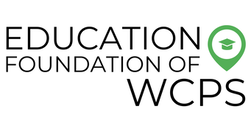Check out our NEW Financial Literacy Resources page for educators, parents and students: Here!
Education Foundation of WCPS Financial Literacy Curriculum is a financial literacy and college financial planning curriculum. Along with the support of local mentors, the curriculum helps students overcome the challenges of financial literacy and funding, empowering them to apply to, attend, and graduate from college and reach their greatest potential. The Education Foundation of WCPS provides curriculum and mentors for students in the Advancement Via Individual Determination (AVID) elective in North Hagerstown High School, Smithsburg High School, and South Hagerstown High School. Students learn basic financial concepts such as:
While learning the value of a college education, students also learn about the costs associated with higher education. They develop a personal budget projecting tuition costs and other expenses and identify sources of revenue, including financial aid, loans, scholarship opportunities, family contribution, and employment earnings. The Education Foundation of WCPS has expanded this curriculum into middle schools where it aligns with essential math curriculum standards. Plans are being made to expand the program into elementary schools and funding has been allocated to provide an immersive financial literacy experience that can be taught at all grade-levels.
Education Foundation of WCPS Financial Literacy Curriculum is a financial literacy and college financial planning curriculum. Along with the support of local mentors, the curriculum helps students overcome the challenges of financial literacy and funding, empowering them to apply to, attend, and graduate from college and reach their greatest potential. The Education Foundation of WCPS provides curriculum and mentors for students in the Advancement Via Individual Determination (AVID) elective in North Hagerstown High School, Smithsburg High School, and South Hagerstown High School. Students learn basic financial concepts such as:
- Saving
- Budgeting
- Bank accounts
- Credit/debit
- Predatory lending
- Planning/forecasting
- Debt management
While learning the value of a college education, students also learn about the costs associated with higher education. They develop a personal budget projecting tuition costs and other expenses and identify sources of revenue, including financial aid, loans, scholarship opportunities, family contribution, and employment earnings. The Education Foundation of WCPS has expanded this curriculum into middle schools where it aligns with essential math curriculum standards. Plans are being made to expand the program into elementary schools and funding has been allocated to provide an immersive financial literacy experience that can be taught at all grade-levels.
